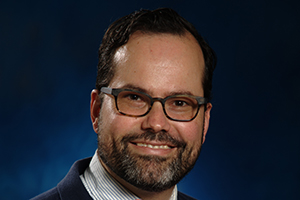August 6, 2018
SVSU history professor authors book on Cold War-era polygraph use
 John Baesler, associate professor of history at Saginaw Valley State University, has written his first book, examining the topic of polygraph use during and after the Cold War.
John Baesler, associate professor of history at Saginaw Valley State University, has written his first book, examining the topic of polygraph use during and after the Cold War.
The book, “Clearer Than Truth: The Polygraph and the American Cold War (Culture, Politics, and the Cold War),” is based on how the use of polygraph technology – often referred to as the lie detector – greatly increased after World War II and the ramifications of the increase in usage by the U.S. government.
“The book is a history of the polygraph and particularly the role that the polygraph has played in U.S. national security policies since the second World War,” Baesler said. “Polygraph technology had been around since the early 20th century, but it was really only after World War II that American government agencies began using it on a large scale to test the loyalty of applicants for federal jobs and employees in the federal government, as well as to establish the bona fides of sources working for U.S. intelligence services.”
The book is for sale at vendors including Amazon.com. It tracks the history of polygraph use, justifications for using it, as well as protests against it by citizens and civil liberties groups, from the Cold War to the present.
He said he wrote the book due to his interest in how the U.S. used the polygraph technology compared to other government systems.
“To me, the history of the polygraph exam was presented by its defenders as a scientific, objective and therefore fair procedure, while at the same time it was seen as hard-nosed – almost like torture – and therefore suitable to smoke out communist spies and so forth,” he said.
“In short, I chose to write about this topic because there is a fascinating, complicated history there that has a larger significance.”
A native of Germany, Baesler earned his undergraduate degree in history and philosophy from Ruprecht-Karls-Universität Heidelberg in 2001 and earned his Ph.D. in U.S. history and cultural history at Indiana University-Bloomington in 2009.
He joined SVSU's history faculty in 2009, and was promoted to associate professor in 2014.
The process to write this book began as his dissertation project at Indiana University, but he continued to work and expanded the research to make the nonfiction book that is on sale today.
“It took me almost 14 years to research and write this book,” he said. “It's been a long journey, but I am very proud of the result.”
